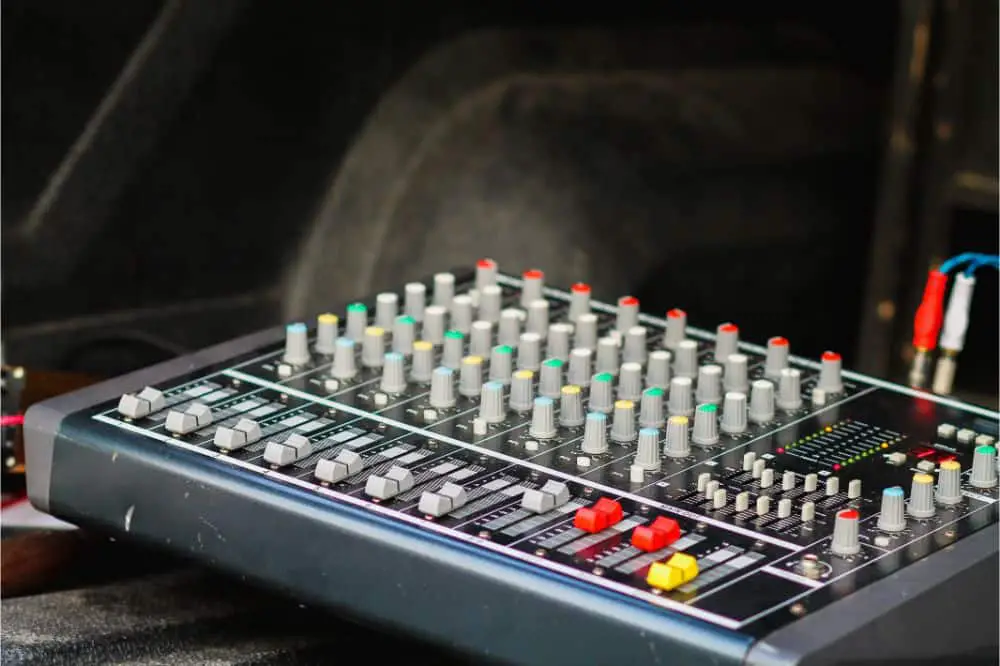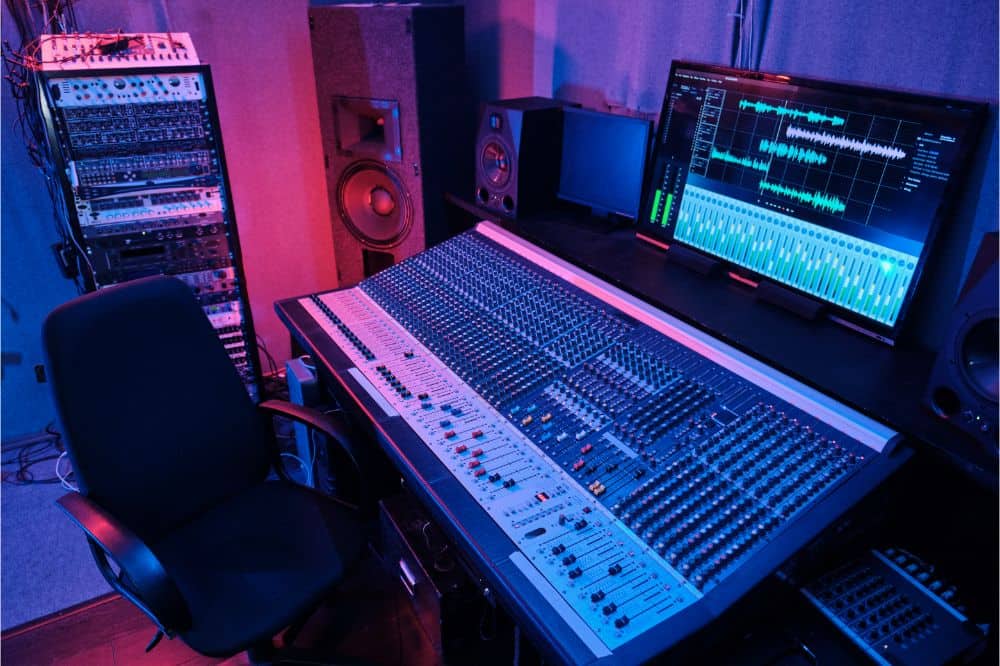Any home studio setup will benefit from the best powered speakers, transforming a simple room into a whole new listening environment.
In case you don’t know, powered speakers are plug-and-play devices that deliver impressive sound quality.
Since mixers help improve sound quality, this begs the question, “Do I need a mixer for powered speakers?”
Well, it depends. While some might argue that buying a mixer isn’t necessary, others might say the opposite.
Before we get to that, let’s talk about the basics first.
What Are Powered Speakers?
If you are short on space, powered speakers come in handy, as they mostly come in small and compact sizes.
Moreover, these portable devices do not require external amplification. Instead, it has a built-in amplifier and doesn’t need to be paired with another piece of equipment.
That said, remember that not all powered speakers are considered active speakers. And that’s why some units might require the use of an audio mixer.
What Is An Audio Mixer?
An audio mixer is a powerful device that seamlessly optimizes sound systems and dramatically improves output.
It has two primary uses:
- To perfectly adjust multiple input volumes, and
- To shape the tone so that everything blends in nicely for the naked ear.
Because of its popularity, a variety of mixers are available in the market, from small units for home use to large studio-quality models.
Simply put, mixers make your life easier by bringing life to sound and music.
Different Types of Mixers
In a nutshell, mixers manipulate audio signals from sound sources to achieve a balanced, ear-pleasing sound.
That said, they come in various types designed for specific needs and uses:
Analog
Analog mixers use an analog circuit to improve the sound quality and volume of audio signals. Unfortunately, most modern mixers no longer make use of this technology.
Digital
Digital mixers use digital signals to manipulate audio. Compared to analog mixers, digital signal processing technology is much more advanced.
Powered
Powered mixers use digital and analog signals to suit a wider customer range. It offers more flexibility when it comes to connecting to a variety of audio equipment.
Do I Need A Mixer for Powered Speakers?
Adding a mixer for powered speakers has some perks in improving your audio setup.
However, other factors, such as the mixer model, current setup, and external equipment, may come into play.
While there are two possible layouts (in-line and split), the features are most likely the same.
Inputs
Here, you can find various ports wherein you can plug in your audio sources. Generally, you will see XLR inputs, RCA, and some 5mm jacks.
EQ Settings
EQ allows you to adjust the frequency levels of your inputs.
You will notice that higher-end mixers usually offer more sophistication, as they will have more faders and options to improve fine details.
Volume Controls
Mixers allow you to control the outgoing volume levels, creating a smooth listening environment for the audience.
Onboard Effects
Onboard effects are great if you plan to adjust the reverb, compression, and other dynamics to improve sound quality.

How To Connect a Mixer To Powered Speakers
If you find that your powered speakers require a mixer, you need to keep a few things in mind when it comes to setting them up.
For one, you must familiarize yourself with your speakers and mixer’s model, know their connection types, and read the operations manual.
Ideally, use long TRS and XLR cables for balanced lines because they aren’t susceptible to noise problems.
On the other hand, unbalanced lines need short cables to reduce interference.
Likewise, you should check if all knobs, buttons, and power switches work to prevent any problems later on.
Once you’ve got that covered, here are the steps to connecting a mixer to powered speakers:
Step 1: Find the Perfect Spot for Your Equipment
How every piece of equipment is positioned makes or breaks the entire listening experience, so pay attention to how you set them up.
The goal is to find the perfect spot for your powered speakers so that the audience can listen to the best sound quality.
One basic rule is that microphones should never be placed in front of the speakers to avoid creating interference.
You will also need to place the mixer at the back of the powered speakers, but make sure they don’t physically touch.
Step 2: Determine the Speaker Cable Layout
Aside from creating good sound quality, you also have to consider safety.
Hence, find a great path for the wires and cables so that they don’t get damaged or, worse, cause accidents.
If applicable, keep them short to prevent interference. You can keep any excess cable or wiring organized by coiling them in a safe spot.
Step 3: Connect the Mixer to the Speakers
When doing this, it’s a good idea to turn off both the speakers and the mixer first.
Switch them on only after you have successfully connected them using the right cables.
Step 4: Plug in the Components
Now that you have completed all the basic connections, it is time to add the other components to the mix.
You can plug in your laptop, mic cables, RCA wires, audio cables, and instrument cables.
While most mixers and speakers have internal grounding, some may require you to use ground wires for added safety.
Step 5: Power Up Your Equipment
Set the speakers and mixer to their minimum settings to prevent damaging your equipment.
Remember to turn on the mixers to prevent noise switching.
Step 6: Soundcheck
Make sure everything works, from the power to every single component.
If you encounter any issues, look for the correct mixer output or change the mixer channel. Continue adjusting the mixer settings to improve sound quality.
Using a Mixer With Powered Speakers
Powered speakers are more convenient than other speaker types because they already play an audible sound.
Meanwhile, mixers are used to have more control over the sound that is being produced.
So, when asking, “Do I need a mixer for powered speakers?” the answer is it depends.
If you are happy with your powered speakers and how they deliver sound, there is no reason for you to get a mixer.
On the other hand, if you are looking to level up your listening experience, then a mixer can help you achieve that.

